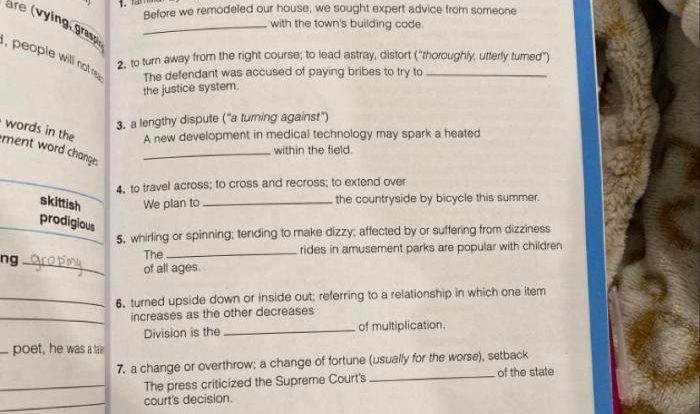Embark on a journey of language enrichment with the Wordly Wise Book 3 Lesson 2 PDF, a comprehensive resource designed to foster vocabulary development, reading comprehension, and language skills.
This lesson delves into the intricacies of vocabulary acquisition, employing proven techniques to expand students’ lexical knowledge. It also analyzes the reading comprehension activities, highlighting key concepts and strategies for enhancing comprehension skills.
Introduction
This analysis provides an in-depth examination of the “Wordly Wise Book 3 Lesson 2” PDF, a comprehensive educational resource designed to enhance students’ vocabulary, reading comprehension, and language skills. The lesson follows a structured approach, employing effective techniques to foster language development and critical thinking.
Vocabulary Development
The lesson utilizes various vocabulary development techniques to expand students’ lexical knowledge. Key vocabulary words are identified and defined, and their usage is explored through contextual examples. Strategies such as word maps, analogies, and synonyms/antonyms are employed to reinforce word meaning and improve retention.
Target Vocabulary Words and Definitions
- Colossal: Extremely large
- Desolate: Empty and barren
- Exquisite: Extremely beautiful
- Fervent: Ardent and passionate
- Fortuitous: Occurring by chance or luck
Reading Comprehension
The lesson incorporates engaging reading comprehension activities to develop students’ understanding and analysis skills. Students are presented with texts that explore various themes and concepts, followed by questions and exercises that assess their comprehension. The activities focus on key reading skills such as main idea identification, inference, and vocabulary usage.
Key Concepts and Skills Addressed
- Main idea identification
- Inference
- Vocabulary usage
- Text structure analysis
- Figurative language interpretation
Language Skills
The lesson also emphasizes the development of language skills, including grammar and usage. Students are introduced to grammar rules and usage conventions, and their understanding is tested through exercises and activities. The focus is on improving students’ accuracy and fluency in written and spoken language.
Grammar and Usage Rules Covered
- Subject-verb agreement
- Verb tenses
- Pronoun usage
- Adjective and adverb placement
- Preposition usage
Assessment
The lesson incorporates various assessment strategies to evaluate students’ progress and understanding. These assessments include quizzes, tests, and projects, each designed to measure specific skills and knowledge. The assessments provide feedback to both students and teachers, allowing for adjustments to instruction as needed.
Types of Assessments and Their Purpose, Wordly wise book 3 lesson 2 pdf
- Quizzes: Short, frequent assessments to check comprehension and retention
- Tests: Comprehensive assessments to evaluate overall progress and mastery
- Projects: Extended assignments that allow students to demonstrate their understanding and creativity
Teacher Resources: Wordly Wise Book 3 Lesson 2 Pdf
The lesson comes with a range of teacher resources to support instruction. These resources include lesson plans, worksheets, and answer keys. The resources provide teachers with guidance on how to effectively implement the lesson and assess student learning.
Value of These Resources for Teachers
- Provide a structured lesson plan
- Offer ready-to-use materials
- Facilitate differentiated instruction
- Enable efficient assessment
Classroom Implementation
To ensure effective implementation of the lesson, it is important to follow best practices. These include creating a positive learning environment, differentiating instruction to meet individual student needs, and providing timely feedback. Additionally, teachers should address challenges such as limited vocabulary and reading comprehension difficulties.
Best Practices for Classroom Implementation
- Create a positive learning environment
- Differentiate instruction
- Provide timely feedback
- Address challenges
Popular Questions
What is the target audience for this lesson?
This lesson is designed for students in grades 3-5 who are looking to improve their vocabulary and reading comprehension skills.
What are the key vocabulary words taught in this lesson?
The key vocabulary words taught in this lesson include: amiable, capricious, diligent, frugal, and judicious.
What types of assessment strategies are used in this lesson?
This lesson uses a variety of assessment strategies, including formative assessments, summative assessments, and self-assessments.
